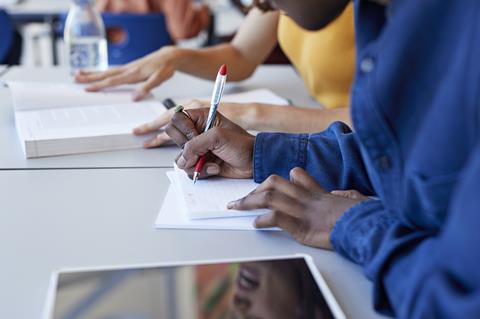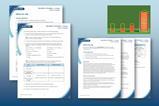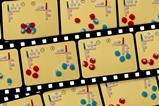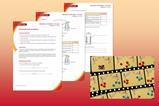Passing A-levels, Advanced highers and Leaving cert requires different skills to earlier exams. Here are three core skills and ways to teach them

I have used a range of techniques to help students develop specific skills, but which are important? Identifying the most important skills is a good starting point, and STEM Learning’s excellent poster Top 10 employability skills can help. It categorises skills into ‘how you work’, ‘how you think’ and ‘how you work with others’, plus there’s a guide on how to develop these skills in your lessons.
At the start of post-16 courses, I focus on the key skills of note-making, revision and IT. These help my students succeed in their courses, and through their further education and careers. Here’s how to approach them.
Making notes to solve problems
Students starting post-16 courses tend to copy every single word, or write what you say verbatim. Getting them to independently produce notes takes some effort. Usually, I introduce an idea, go over the keywords, give examples of how to use these words in explanations. I then give students time to write down what they understand and ask them to share their written sentences.
I started using Cornell Notes a few years ago with my A-level groups. Following positive feedback from students, I began using them with younger classes, down to 11- and 12-year olds.
To help students recall content, I get them to construct questions related to their notes, in the following lesson, using ‘what/why/how/explain/describe’. Alongside this, I incorporate dual coding. Deciding which images to use results in students remembering more. In chemistry, I model drawing the steps described in titration calculation questions. This helps students to identify what mathematical steps are required.
Revision skills for self-motivation
Successful students realise that revising for their final school exams is a whole different ball game to revision for exams at 16. As some of my recent students recall, they need to ‘expand beyond the textbook as questions often required abstract thinking around the topic’, ‘do all the practice papers available to get an idea of the type of questions they might ask’, ‘do questions on the same topic but different scenarios to make sure I had fully grasped what I needed to know’ and ‘looking at topics holistically’ (thanks to Brad, Sikkum and Nam).
Literacy for science is critical in demonstrating science context. Many students use flash cards, but you need to show them how to effectively make and use them. Additionally, using the Frayer model helps students develop their understanding of keywords. Practising exam questions is important, but the students need to know how to communicate their ideas effectively. Graphic organisers and structure strips help them to scaffold ideas for extended response questions. I have used them for a range of contexts, from summarising assessed practicals methodology to facts for fuel cells.
Teaching exam technique is part of revision: identifying command words, recall of facts, linking ideas. Before they can practise extended response questions, students need to be able to recall the facts. Once they have those facts, they can attempt exam questions and practise managing their timing. You can also stretch your students with questions from Cambridge International Education, Isaac Physics, UK Chemistry Olympiad and C3L6 challenges. This has the added benefit of preparing them for university interviews.
Boost IT skills for organisation
Over lockdown, it became apparent many of my students were unfamiliar with basic IT skills: converting Word documents to pdf, uploading images, creating tables, for example. Trying to teach these skills remotely was torturous. However, my A-level students, who were used to using their devices prior to lockdown, already had these skills. As a result, I am determined to include activities that enable my students to practise these skills in class.
It is immensely helpful if students know how to organise their files. Show them how to create and name folders, name and print files. It is easy to assume students who can manipulate apps can use MS Word or Excel. But they can’t necessarily. Teach them how to insert symbols (⁰), change font for super- and sub-scripts (equations) and plot graphs (CPAC5).
We teach skills not just for examination success, but for future studies and employability. As one of my ex-students puts it, doing ‘chemistry at Imperial has been a rollercoaster so far, [but] I seem to be in a better position with more experience than some with the variety of stuff we do’. It’s that all important ‘stuff’ – aka skills – that makes the difference.
More resources
There are plenty of ways to boost your knowledge of and strategies for skills teaching, as well as opportunities for students to learn more too. Here’s a selection that I find useful.
Online
- Learn more about the science of learning from the The Learning Scientists and follow them on Twitter under @AceThatTest
- Try Seneca’s useful and free CPD course on dual coding.
- Check out Physics and Maths Tutor, a fantastic revision resource, with questions organised by topic.
- Find out more about employability skills and encourage your students to read about them and the career profiles at A future in chemistry.
- Try a resource matching skills with resources: Guess the career.
- Use the Activities that link clasroom experiments to careers from A future in chemistry with your students.
- Read the Gatsby benchmarks of Good career guidance.
- Share this video, How to study effectively for school or college, with your students.
Blogs
- Reading in science from Teaching & learning diaries.
- Tackling a mass of scientific misconceptions from the Research Schools Network.
- Writing in science: a symposium from Bunsen blue.
Books
- The A level mindset by Steve Oakes and Martin Griffin
- Fiorella & Mayer’s generative learning in action by Zoe and Mark Enser
More resources
There are plenty of ways to boost your knowledge of and strategies for skills teaching, as well as opportunities for students to learn more too. Find a selection that I find useful online on the Education in Chemistry website: rsc.li/363iV6g














1 Reader's comment